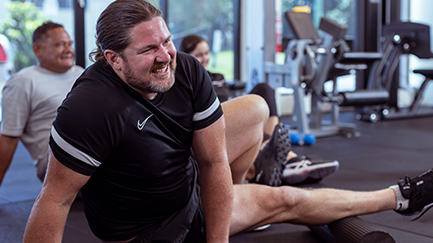
Supporting veterans through service related injuries
The Mates4Mates physical rehabilitation team is here to help veterans improve mobility, manage pain and enhance their overall wellbeing.

Uncertainty is the unsettling feeling of not knowing what lies ahead. It is a psychological experience that is deeply uncomfortable for all individuals.
Defence members are often trained to take control of situations, find solutions, and seek certainty. Feelings of uncertainty may be uncomfortable and not well tolerated.
The brain and uncertainty
The brain is a prediction-making machine, so it will attempt to create certainty, to avoid the experience of living with uncertainty.
In an effort to create certainty, some individuals may experience unhelpful cognitive coping strategies like racing thoughts or hyper-focusing on potential outcomes of an uncertain situation, others may experience general feelings of anxiety.
Other people may exhibit behavioural coping strategies like avoidance of the situation or over-controlling it to force a certain outcome.
Many people will struggle to tolerate uncertainty and may engage in many sub-conscious cognitive, behavioural, and emotional strategies in an attempt to reduce its impact.
Uncertainty within the Defence Force
There are specific instances of uncertainty which may impact on current and ex-serving Defence Force members and family members including posting schedules, deployments, field exercise, discharge, and the transition into civilian life.
An additional difficulty of these uncertain situations is the inability to exert autonomy over these situations because of the requirements of military employment.
Veterans dealing with uncertainty
As mentioned previously, military personnel are trained to take control and create a sense of certainty in military scenarios. Being able to rely on your colleagues to consistently and competently perform required tasks creates feelings of certainty in military environments. It helps build understanding, mateship and camaraderie amongst the Defence Force.
When a veteran is faced with an uncertain future, feelings of uncertainty are likely to increase. In particular, Injury, illness and transition out of the Defence Force may compound these challenging feelings. In addition, individuals may be impacted by decisions that are out of their control, such as those that have to be made by medical professionals. This can lead to maladaptive coping strategies being sub-consciously deployed, in an attempt to re-establish feelings of certainty.
Unhelpful coping strategies may include increased alcohol usage, denial of the situation (such as continuing to work/train while injured), becoming irritable with colleagues or at home, or even self-blame and punishment such as negative thoughts of oneself (“I am weak for being injured”).
It is important to remember, that uncertainty is unpleasant for everyone, but there are ways to decrease unhelpful coping whilst increasing adaptive ways of coping.
Working through uncertainty
To learn strategies to cope with your particular emotions and reactions to uncertainty, you need to first define the feelings you are experiencing.
Take a moment to reflect on what you are feeling, by considering thoughts, emotions and physical experiences and reflect on how you normally attempt to manage distress behaviourally (avoidance, over-controlling, self-soothing, etc.).
Once you have a robust understanding of your experience, then you can begin to explore strategies to help reduce the levels of unpleasant activation of your central nervous system, effectively calming the body.
Some methods include:
These skills allow you to exert some control over your nervous system, which makes it easier for your brain (pre-frontal cortex) to think through the uncertain situation with more clarity.
Alternatively, if you are feeling calm, it could be useful to engage in cognitive challenging such as writing down your thoughts and fears about the situation, coming up with contingency plans, and challenging these thoughts in terms of realistic probabilities. This activity can be completed with guidance from a psychologist.
Support at Mates4Mates
Mates4Mates offers a range of services designed to support veterans and families in managing uncertainty and mental health conditions that may be connected to feelings of uncertainty.
Veterans and family members can access clinical services at Mates4Mates such as psychology and counselling to work through the discomfort of uncertainty. Referrals are required to visit a Mates4Mates psychologist.
To find out more, reach out to Mates4Mates on 1300 4 MATES (62 837) for a confidential chat.
Written by Jonathan Moscrop, Mates4Mates Clinical Lead – Psychological Services

The Mates4Mates physical rehabilitation team is here to help veterans improve mobility, manage pain and enhance their overall wellbeing.